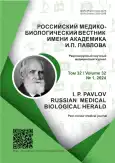Opinion of Obstetricians and Gynecologists on Problems of Rehabilitation of Women with Early Reproductive Losses
- Authors: Aleshkina O.S.1, Konovalov O.E.2
-
Affiliations:
- Medical Center ‘Nadezhda’
- Peoples' Friendship University of Russia named after Patrice Lumumba
- Issue: Vol 32, No 1 (2024)
- Pages: 17-24
- Section: Original study
- Submitted: 26.07.2023
- Accepted: 10.01.2024
- Published: 07.04.2024
- URL: https://journals.eco-vector.com/pavlovj/article/view/566777
- DOI: https://doi.org/10.17816/PAVLOVJ566777
- ID: 566777
Cite item
Abstract
INTRODUCTION: One of the most important problems is preserving reproductive potential of the population, which requires development of principally new approaches and organizational solutions.
AIM: To study the opinion of obstetricians and gynecologists on preventability of early reproductive losses and rehabilitation of women after them.
MATERIALS AND METHODS: A sociological survey covered 128 obstetricians and gynecologists working in women’s consultation clinics, specialized gynecological clinics and gynecological departments of multidisciplinary hospitals of Ryazan. Mathematical processing of the results was performed using variation statistics methods.
RESULTS: More than half (60.3%) of the surveyed doctors believe that early pregnancy losses (EPL) in women are conventionally preventable; 28.6% of respondents think they are incompletely preventable and absolutely unpreventable; 11% of respondents found it difficult to answer. A vast majority of respondents (92.1%) were of the opinion that women with EPL need additional health monitoring and rehabilitation. Concerning the opinion of doctors of the awareness of women of necessity for rehabilitation after EPL, 23.6% of surveyed doctors considered them sufficiently informed, 52.7% — insufficiently informed, 12.8%— completely uninformed, and 10.9% found it difficult to answer. The average score on the 5-point scale of the extent of motivation of women for rehabilitation after EPL was 3.72.
CONCLUSION: The results of the study are recommended to be considered when taking organizational and managerial decisions on improving complex medical and socio-psychological rehabilitation of women after EPL.
Full Text
About the authors
Oksana S. Aleshkina
Medical Center ‘Nadezhda’
Email: aleshkinaoxana@yandex.ru
ORCID iD: 0000-0002-0505-197X
Russian Federation, Ryazan
Oleg E. Konovalov
Peoples' Friendship University of Russia named after Patrice Lumumba
Author for correspondence.
Email: konovalov_oe@mail.ru
ORCID iD: 0000-0003-1974-9882
MD, Dr. Sci. (Med.), Professor
Russian Federation, MoscowReferences
- Murzabayeva SSh, Bayturina AT. Legislative regulation in the sphere of reproductive health care in Russian Federation. Pediatric and Adolescent Reproductive Health. 2013;(1):14–24. (In Russ).
- Kotova EG, Kobyakova OS, Starodubov VI, et al. Osnovnyye pokazateli zdorov’ya materi i rebenka, deyatel’nost’ sluzhby okhrany detstva i rodovspomozheniya v Rossiyskoy Federatsii: statisticheskiye materialy. Moscow; 2021.
- Volkov VG, Akhilgova ZS. Risk factors of early pregnancy loss. Journal of New Medical Technologies, eEdition. 2020;(1):66–72. Available at: http://vnmt.ru/Bulletin/E2020-1/1-11.pdf. Accessed: 2023 July 26. (In Russ). doi: 10.24411/2075-4094-2020-1659
- Starodubov VYi, Sukhanova LP, Sychenkov YuG. Reproductive losses as medical social problem in demographic development of Russia. Social Aspects of Population Health. 2011;(6). Available at: http://vestnik.mednet.ru/content/view/25/52/lang,en/. Accessed: 2023 July 26. (In Russ).
- Bushmeleva NN, Vakhrusheva YuN. Etiopathogenetic aspect of early reproductive loss within the framework of improving organization of care delivery to women (analytical review). Social Aspects of Population Health. 2020;(5). Available at: http://vestnik.mednet.ru/content/view/1199/30/lang,en/. Accessed: 2023 July 26. (In Russ). doi: 10.21045/2071-5021-2020-66-5-6
- Vovk IB, Kondratjuk VK, Trohimovich OB, et al. Algorithm for examination and treatment of women with various forms of early pregnancy losses. Zdorov’ye Zhenshchiny. 2013;(6):97. (In Russ).
- Titova AV, Andreeva EM, Martynova TA, et al. Modern features of patients with threatened abortion, spontaneous and induced abortions. Smolensk Medical Almanac. 2022;(3):106–9. (In Russ).
- Radzinskiy VE, Aleyev IA, Bril’ YuA, et al. Nerazvivayushchayasya beremennost’. Metodicheskiye rekomendatsii MARS (Mezhdistsiplinarnoy assotsiatsii spetsialistov reproduktivnoy meditsiny). Moscow: Status Praesens; 2015. (In Russ).
- Saveleva GM, Aksenenko VA, Andreeva MD, et al. Micronized progesterone therapy of recurrent pregnancy loss (results of multi-center TRISTAN-1 study). Obstetrics and Gynecology. 2017;(11):44–55. (In Russ). doi: 10.18565/aig.2017.11.44-55
- Lu Y, Su R, Chen R, et al. Predictor assessment of complete miscarriage after medical treatment for early pregnancy loss in women with previous cesarean section. Medicine (Baltimore). 2022;101(41):e31180. doi: 10.1097/MD.0000000000031180
- Hee JY, Huang S, Leong KP, et al. Pregnancy loss and the risk of rheumatoid arthritis in Chinese women: findings from the China Kadoorie biobank. BMC Public Health. 2022;22(1):1768. doi: 10.1186/s12889-022-14163-z
- Carrera M, Millan FP, Alcázar JL, et al. Effect of Hysteroscopic Metroplasty on Reproductive Outcomes in Women with Septate Uterus: Systematic Review and Meta-Analysis. J Minim Invasive Gynecol. 2022;29(4):465–75. doi: 10.1016/j.jmig.2021.10.001
- Lim G–Y, Jung NY, Jun KY, et al. Pregnancy loss and Income in the Republic of Korea using National Health Insurance Service Data, 2008–2014. BMC Public Health. 2022;22(1):188. doi: 10.1186/s12889-022-12588-0
- Statistical reporting forms No. 13 ‘Information on pregnancy with abortion outcome’ for the Ryazan region for 2014–2021. (In Russ).
- Klinicheskiye rekomendatsii: Vykidysh (samoproizvol’nyy abort). 2021. [Internet]. Available at: https://cr.minzdrav.gov.ru/schema/670_1. Accessed: 2023 July 26. (In Russ).
- Gou L, Liu T, Wang Y, et al. Clinical utilization of chromosomal microarray analysis for the genetic analysis in subgroups of pregnancy loss. J Matern Fetal Neonatal Med. 2022;35(22):4404–11. doi: 10.1080/14767058.2020.1849126
- Fernández–Basanta S, Coronado C, Bondas T, et al. Unraveling the grief of involuntary pregnancy loss: A meta-ethnography of midwives' and nurses' emotional experiences. Scand J Caring Sci. 2022;36(3):599–613. doi: 10.1111/scs.13028
- Grégoire–Briard F, Horwood G, Berger P, et al. A Patient-Centred Approach to Early Pregnancy Loss: The First 18 Months of a Canadian Outpatient Program for Early Pregnancy Loss (OPEL). J Obstet Gynaecol Can. 2022;44(5):503–7. doi: 10.1016/j.jogc.2021.11.018
Supplementary files













